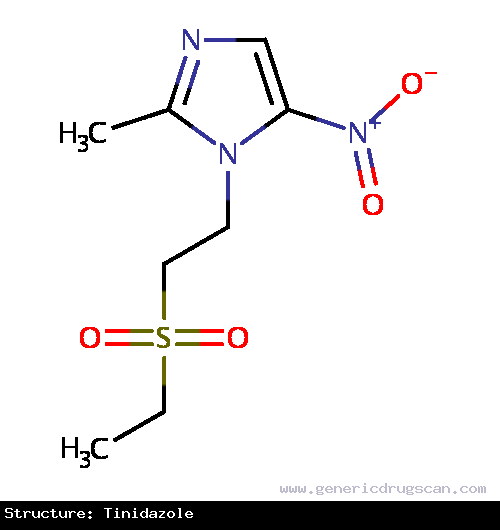Tinidazole Drug: Indication, Dosage, Precaution, Side Effect , Storage, Category Type and corresponding Brands - www.genericdrugscan.com
Tinidazole
Drug Status in USA : Approvedpronunciation
pronounced as (tye ni' da zole)
Why is this medication prescribed?
Tinidazole is used to treat trichomoniasis (a sexually transmitted disease that can affect men and women), giardiasis (an infection of the intestine that can cause diarrhea, gas, and stomach cramps), and amebiasis (an infection of the intestine that can cause diarrhea, gas, and stomach cramps and can spread to other organs such as the liver). Tinidazole is in a class of medications called antiprotozoal agents. It works by killing the organisms that can cause infection.
How should this medicine be used?
Tinidazole comes as a suspension (liquid) prepared by the pharmacist and a tablet to take by mouth. It is usually taken with food as a single dose or once a day for 3 to 5 days. To help you remember to take tinidazole (if you are to take it for more than one day), take it around the same time every day. Follow the directions on your prescription label carefully, and ask your doctor or pharmacist to explain any part you do not understand. Take tinidazole exactly as directed. Do not take more or less of it or take it more often than prescribed by your doctor.
Shake the liquid well before each use to mix the medication evenly.
Take tinidazole until you finish the prescription, even if you feel better. If you stop taking tinidazole too soon or skip doses, your infection may not be completely cured and bacteria may become resistant to antibiotics
What are the precautions to be followed?
Before taking tinidazole,- tell your doctor and pharmacist if you are allergic to tinidazole, metronidazole (Flagyl), or any other medications.
- tell your doctor and pharmacist what prescription and nonprescription medications, vitamins, nutritional supplements, and herbal products you are taking. Be sure to mention any of the following: anticoagulants ('blood thinners') such as warfarin (Coumadin); antifungals such as fluconazole (Diflucan), itraconazole (Sporanox), and ketoconazole (Nizoral); carbamazepine (Tegretol); cimetidine (Tagamet); clarithromycin (Biaxin); cyclosporine (Neoral, Sandimmune); danazol (Danocrine); delavirdine (Rescriptor); dexamethasone (Decadron); diltiazem (Cardizem, Dilacor; Tiazac); erythromycin (E.E.S., E-Mycin, Erythrocin); ethosuximide (Zarontin); fluorouracil (Adrucil ); fluoxetine (Prozac, Sarafem); fluvoxamine (Luvox); fosphenytoin (Cerebyx); HIV protease inhibitors such as indinavir (Crixivan) and ritonavir (Norvir); isoniazid (INH, Nydrazid); lithium (Lithobid); metronidazole (Flagyl); nefazodone (Serzone); oral contraceptives (birth control pills); oxytetracycline (Terramycin); phenobarbital (Luminal, Solfoton); phenytoin (Dilantin); rifabutin (Mycobutin); rifampin (Rifadin, Rimactane); tacrolimus (Prograf); troglitazone (Rezulin); troleandomycin (TAO); verapamil (Calan, Covera, Isoptin, Verelan); and zafirlukast (Accolate). Also tell your doctor if you are taking disulfiram (Antabuse) or have stopped taking it within the past 2 weeks. Your doctor may need to change the doses of your medications or monitor you carefully for side effects.
- if you are taking cholestyramine (Questran), you should not take it at the same time that you take tinidazole. Ask your doctor or pharmacist how to space doses of these medications.
- tell your doctor if you have a yeast infection now; if you are being treated with dialysis (mechanical removal of waste in patients with kidney failure); or if you have or have ever had seizures or nervous system, blood, or liver disease.
- tell your doctor if you are pregnant or plan to become pregnant. If you become pregnant while taking tinidazole, call your doctor. Do not breastfeed while you are taking tinidazole and for 3 days after you finish your treatment.
- know that you should not drink alcohol while you are taking this medication and for 3 days afterwards. Alcohol may cause an upset stomach, vomiting, stomach cramps, headaches, sweating, and flushing (redness of the face).
What are possible side effects of this medication ?
Tinidazole may cause side effects. Tell your doctor if any of these symptoms are severe or do not go away:- sharp, unpleasant metallic taste
- upset stomach
- vomiting
- loss of appetite
- constipation
- stomach pain or cramps
- headache
- tiredness or weakness
- dizziness
- seizures
- numbness or tingling of hands or feet
- rash
- hives
- swelling of the face, throat, tongue, lips, eyes, hands, feet, ankles, or lower legs
- hoarseness
- difficulty swallowing or breathing
How to store the medication and dispose it of after its use later?
Keep this medication in the container it came in, tightly closed, and out of reach of children. Store it at room temperature and away from excess heat and moisture (not in the bathroom). Protect the medication from light. Discard any remaining liquid after 7 days.
Unneeded medications should be disposed of in special ways to ensure that pets, children, and other people cannot consume them. However, you should not flush this medication down the toilet. Instead, the best way to dispose of your medication is through a medicine take-back program.
Drug Category/Class
- Anti-Infective Agents
- Antiprotozoal Agents
- Drugs for Peptic Ulcer and Gastro-Oesophageal Reflux Disease (Gord)
- Drugs for Acid Related Disorders
- Antibacterials for Systemic Use
- Antiinfectives for Systemic Use
- Imidazole Derivatives
- Nitroimidazole Derivatives
- Antiparasitic Products, Insecticides and Repellents
- Agents Against Protozoal Diseases
- Antitrichomonal Agents
- Alkylating A
| Prescribed | For the treatment of trichomoniasis caused by T. vaginalis in both female and male patients. Also for the treatment of giardiasis caused by ... |
| Weight : | 247.272 |
| Structure | Tinidazole |
 | |
| Formula | C8H13N3O4S |
Tinidazole has 66 Brands listed
Search Generic Drugs alphabetically
